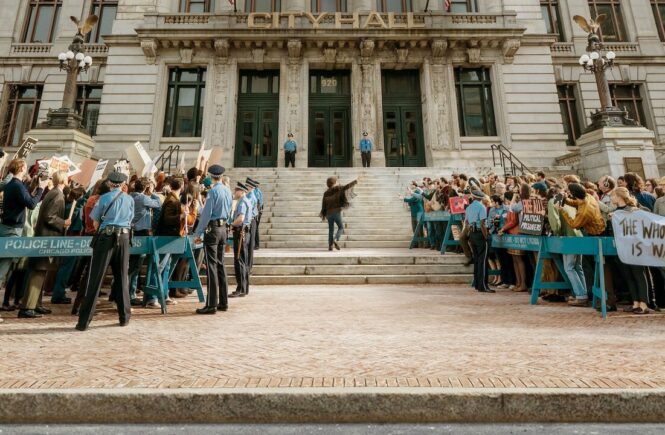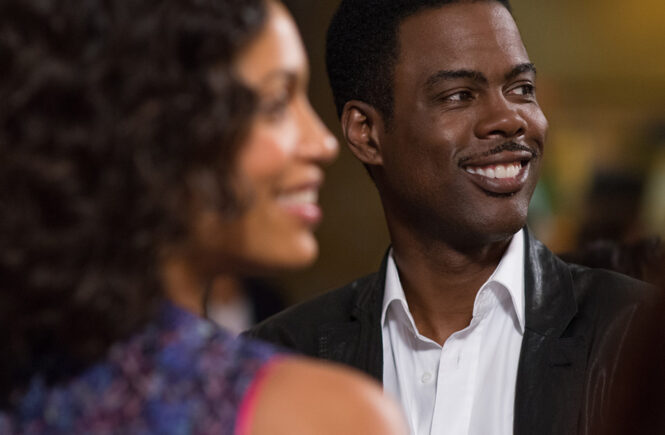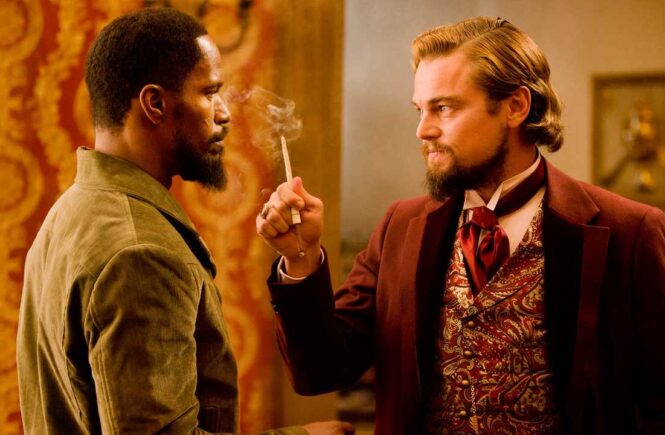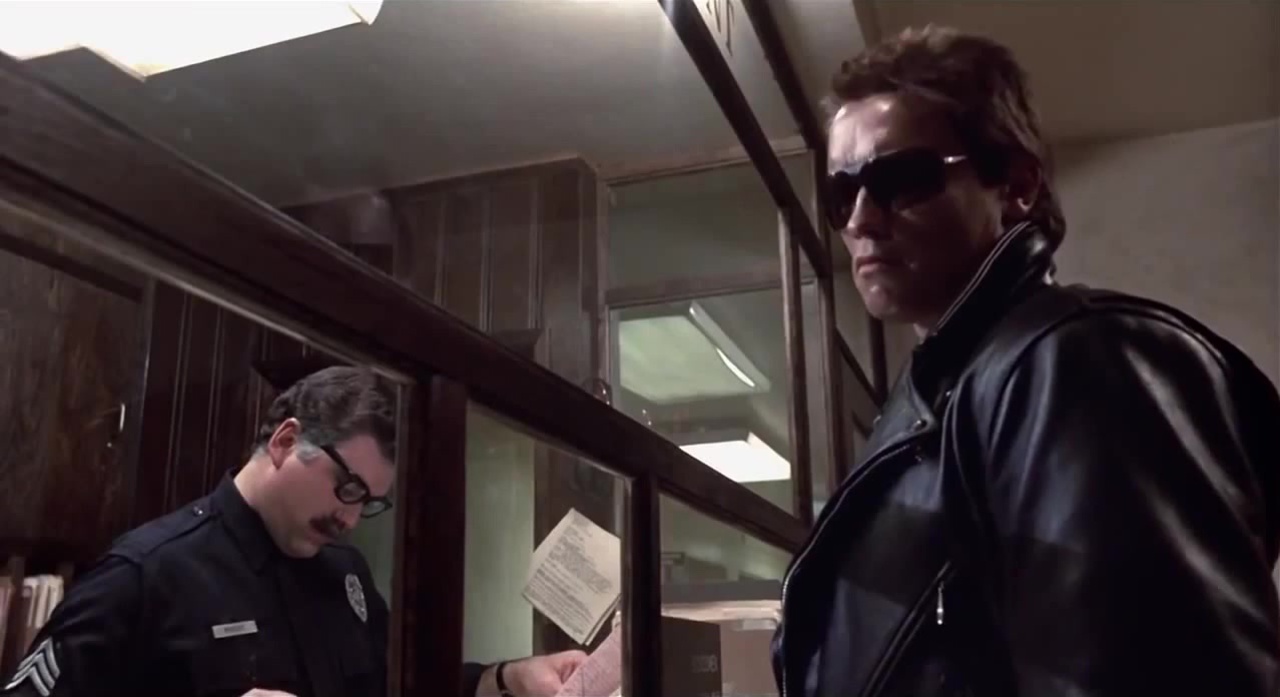
I believe “The Trial of the Chicago 7” to be a fantastic film; powerful, timely, and timeless. Though it may suffer from characters feeling like caricatures in the service of a message, I could care less as the impact it had on me overrides any minor defects it may carry. Much of its effectiveness, without a question, comes from the current political atmosphere we are in, especially as we crescendo to an election less than 3 weeks away, but I imagine its story to be potent and relevant long after the votes have been counted.
However, in a time when suppression of free speech/voter rights, police brutality, and the messages of the black lives matter movement are being echoed across the nation, it would be hard to not feel some kind of way about this film, which blatantly addresses all of these topics. Though it is set in 1969, it painfully feels of the now. I had moments of palpable frustration watching the film, watching as it mirrored our current issues and the incapability of those in authority to adequately or fairly address them.
One of the toughest scenes to watch in the film, and one of the most effective, was when Bobby Seale (co-founder of the Black Panther Party), played by Yahya Abdul-Mateen II, was irredeemably treated by the court; having been beaten, gagged and chained to a court room chair for voicing dissent to the Judge multiple times for being in a trail where his lawyer was not present. It was outrageous seeing the quiet in the court room as Seale was “dealt with” in a closed room. The scene highlights the many issues that were present in the trail of the Chicago 7, where the Judge already seemed to have made up his mind before the trial started. And there are many such moments like this in the film, where the situation of those in the trial seems hopelessly lost and the politics of those in power seemed turned against the people. It is moments like these that Sorkin has written and directed so effectively, that so accurately mirror the emotions felt by many today. And Sorkin uses these low points to play inspiringly into the final scenes of the film that powerfully gives the victory to the Chicago 7, even in their inevitable indictment. It’s a case of the underdog story told simply and effectively.
The writer/director of the film, famed screenwriter Aaron Sorkin (Steve Jobs (2015), Moneyball (2011), Social Network (2010)), knew the capabilities of such a story during the season of an election. As a matter of fact, so did Steven Speilberg who told Sorkin to write a release a film about the Chicago 7 trail right before the 2008 election (https://variety.com/2020/artisans/awards/aaron-sorkin-trial-of-the-chicago-7-tom-hayden-1234807848/). However, as Sorkin says, “I certainly feel there’s never been a more relevant time to release the film.” (https://variety.com/2020/artisans/awards/aaron-sorkin-trial-of-the-chicago-7-tom-hayden-1234807848/). Though this is only Sorkin’s second directorial effort, it would be amiss to not mention that he was standing on the shoulders of giants considering his extensive and distinguished career as a screenwriter in the movie business; having worked with acclaimed directors such as Fincher, Miller, and Boyle. He is also one with a history of writing successful political television and films (“A Few Good Men” (1992), “West Wing” (1999), “Charlie Wilson’s War” (2007)), meaning the subject of this film was right in his wheel house, and given the current climate of frustration and anger, poised for controversy and maximum effect.
Though I have not seen his directorial debut, “Molly’s Game” (2017), I’ve heard that it scored a couple of nominations around the awards circuit, but I suspect this film to have a heavier footfall given it’s timely subject matter, powerful storytelling, and the vast array of A-list actors who knock it out of the park. Sacha Baron Cohen, played Abbie Hoffman, gives one of his best performances, and Eddie Redmayne as Tom Hayden is also fantastic as ever. The entire acting crew I think does a fantastic job, as did Daniel Pemberton with his energizing score (he really is becoming one of the best composers working), as well as the production crew who make the film certainly look as though it belongs in the 60s. The cinematography by Phedon Papamichael is great to see, the dreary colors of the courtrooms contrasted with the bright colors from the scenes before the Chicago riot. It was also great to see Joseph Gordon Levitt again, giving a fine performance. It’s an all out high caliber film, both in front of and behind the camera.
“The whole world is watching!” is chanted as the film ends, and its hard to not see this as a rallying call telling those who see the film to go out and vote. However, the ending also reminded me how powerful a timely film can be and how important it is to release films, even in a time when you cannot go out into a theater to see it. I think this is a story that deserves to be on a big screen, seen with a big audience, drawing up conversations. It could have been an event, but many cannot see it in this format and being on Netflix, I feel as though it’s power may be diminished, but it’s the best we’ve got and I’ll take it over nothing. I greatly enjoyed watching the film, I was moved by it, and I agree with Sorkin that there could not have been a better time to release it, but the film also painfully highlights how timeless such a story is and I imagine myself seeing it again someday, not only to let it’s mettle sink in more, but as a reminder for the commonality of such stories in this country, be it decades apart.





3 comments
Thank you for sharing your info. I truly appreciate your efforts and I am waiting for your next write ups thank you once again. Long Cassani
Thank you for your article. Much thanks again. Really Cool. Timmy Dominiquez
My brother suggested I might like this blog. He was totally right. Jae Butzke